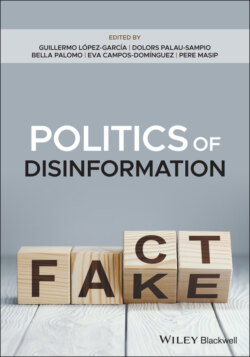Politics of Disinformation

Реклама. ООО «ЛитРес», ИНН: 7719571260.
Оглавление
Группа авторов. Politics of Disinformation
Politics of Disinformation. The Influence of Fake News on the Public Sphere
Contents
List of Illustrations
List of Tables
Guide
Pages
Introduction
Acknowledgements
References
1 Disinformation Matters Analyzing the Academic Production
Introduction
Methodological Approach
Results. Bibliometric Analysis
Bibliographic Analysis. Politics, the Realm of Disinformation
Methodological Trends
New Opportunities for Research
Acknowledgements
References
2 A Materialist Approach to Fake News
Introduction
Scholarly Trends in Fake News Literature
Characterizations of Fake News
Infrastructure Studies
Estimated and Evaluated Effects
Epistemic Critical Approaches
Platform Capitalism and the Fabric of Fake News
Shifts in the Capital Accumulation Cycle
The Downgrade of Journalistic Information
Conclusion
References
3 Using International Relations Theories to Understand Disinformation Soft Power, Narrative Turns, and New Wars
Questioning Reality in International Relations
Changing Power, Changing Mediascapes: Soft Power and the Spreading of Disinformation in the Geopolitics of Platforms
Going Soft : The Popularization of Geopolitics and Disinformative Narratives
Moving Toward a New Form of Strategic Narratives: From War-related to Public Diplomacy-related Disinformation
Final Remarks: Disinformation and the Future of Soft Power
References
4 Do You Believe in Fake After All? WhatsApp Disinformation Campaign During the Brazilian 2018 Presidential Election
Introduction
Small Media, Big Lies: WhatsApp Affordances for Disinformation Campaigns
Materials and Methods
Results and Discussion: Segmenting Outrage as a Propaganda Tool
Conclusion
References
5 The Politics of Disinformation in Indonesia (2014–2019)
Introduction
The Indonesian Political System
Method of Study
Digital Politics and Disinformation
Disinformation in Indonesia’s Presidential Elections (2014–2019)
The Impact of Political Disinformation
Conclusion
References
6 Ideology and Disinformation How False News Stories Contributed to Brexit
Euroskepticism and Disinformation
Ideology and Barthes’s Mythology
The “Euromyths” Text Corpus
Sample Analysis: The “Bent Bananas” Story
Disinformation and Ideology
Conclusion
References
7 Spanish Politicians Dealing with Fake News in the April 2019 General Election
Introduction
Theoretical Framework
Methodology, Research Questions, and Objectives
Results. Content Analysis
Discourse Analysis
Discussion
Conclusions
Acknowledgements
References
8 Checking Verifications Focus and Scope of Collaborative Projects to Monitor Election Campaigns in France, Brazil, and Spain
Introduction
Electoral Processes in a Hybrid, Polarized, and Populist Context
From the 2017 French Presidential Election to the 2019 Spanish General Election
The Challenge of Disinformation in Campaigns
Monitoring Three Election Campaigns
Main Actors and Issues
Fact-checking Results
Conclusion
References
Acknowledgements
Notes
9 Structures of Resistance Citizen-generated Reporting in Times of Social Unrest
Introduction
The Uncertainties of Contemporary Journalism
Creating Structures of Resistance
Fact-checking Traditional Journalism
The Sameness of Anticipating Disinformation
Fact-based Sustainability
Acknowledgements
Funding
References
Notes
10 Robot Strategies for Combating Disinformation in Election Campaigns A Fact-checking Response from Parties and Organizations
Introduction
Context. Computer Propaganda in Election Campaigns and the Origin of Partisan Disinformation
From the Media Crisis to the Boom in Fact-checking Organizations
Research Questions
Methodology
Results. Bots for Generating Content and Combating Disinformation
Discussion and Conclusion
References
Notes
11 “That Prodigious Machinery Designed to Exclude” The Discourse of Post-truth in Algorithmic Culture
Introduction
The Institutional Apparatus of Digital Media
What Do We Talk About When We Talk About Post-truth?
The Discourse of Post-truth and its Principles
First Principle: There is No Need for News to have a Positive Reference to Facts
Second Principle: Truth Comes from Algorithmic Visibility
Third Principle: Truth is Voted Upon, thus it is Quantitative (at least Seemingly)
Fourth Principle: The Rules of this Voting are Not Public (and Maybe they are Ignored Anyway)
Margins
Margin 1: Crisis of Traditional Journalistic Media
Margin 2: The Culture of lulz
Margin 3: Political Management and Post-politics
Conclusions
References
12 Teens, Social Media, and Fake News A User’s Perspective1
Introduction
Teens and Fake News on Social Media: Negotiation, Navigation, and Personalization
Debating News and Social Media with Teens in Brussels
How Teens Interact with Fake News in a Mediatized World
Negotiation: News that Interests or Affects Teens
Navigation: Verifying Content and Sources by Diversifying Platforms, Technologies and Trusted Relationships
Personalization: Influencing News Feeds Through Small (In)action(s)
Conclusions
References
Notes
13 Understanding Which Factors Promote Exposure to Online Disinformation
Introduction
Theoretical Framework
Objectives and Method
Data Collection and Analysis
Findings
Discussion and Conclusion
References
Funding
14 Rumoring, Disinformation, and Contentious Politics in the Digital Age The Case of China and Beyond
Rumor and Disinformation
Rumor Communication: Beyond the Content
Methods
Beyond Truth: Rumoring as Contentious Action in China
The Politics of Rumoring
Rumor, Disinformation, and Contentious Politics: Beyond China
References
About the Authors
Index
WILEY END USER LICENSE AGREEMENT
Отрывок из книги
Edited byGuillermo López-García
University of Valencia Valencia, Spain
.....
Table 1.2 The 10 countries that produce thegreatest volume of articles related to disinformation
The total number of journals from the Communication field that have published research related to disinformation is 64. Journals housing more than 5% of the total publications were considered to be the most committed to this issue; making calls for special issues has an influence on this. The most active are El Profesional de la Información and Social Media + Society, which surpass thirty registers each, New Media & Society and the International Journal of Communication (26), and Digital Journalism (24). Journalism Practice (23), Information, Communication & Society, and Political Communication (20) come close to these figures.
.....